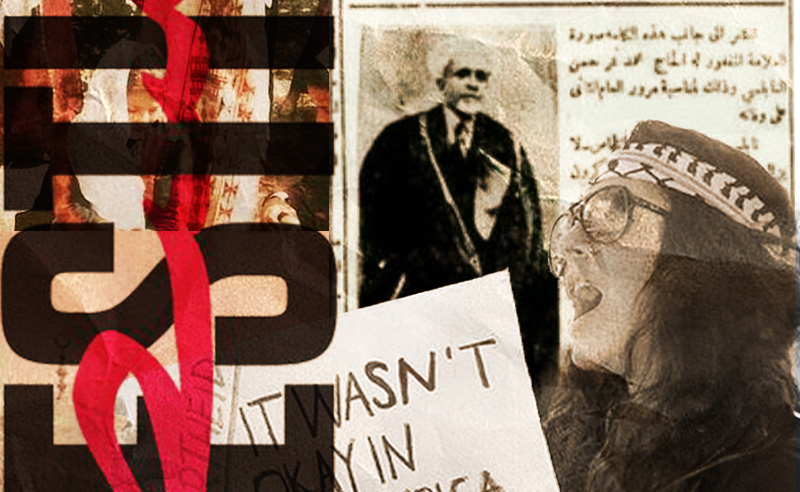The Story Behind Palestine's National Anthem
Before ‘Fida’i’, we look back on the various anthems that shaped Palestine’s identity over the decades.

National anthems are symbols of the patriotic and nationalist imagination in all of its splendour, a musical composition that epitomises the histories and heritages of a nation-state. The national anthem exercises its influence in between the frontiers and borders of the land it celebrates.
-ac125668-7710-46a2-9e71-58e646faf988.jpg) For Palestine, however, whose partition has repeatedly shape-shifted in accordance to foreign occupiers, the national identity would appear to be fragmented and disjointed. With disconnected territories and people, such as the West Bank and Gaza, Palestinians only recently composed their official, unifying national anthem, ‘Fida’i’, or ‘Warrior’, in 1994. It was proclaimed the official anthem in 1996: and the road to do so was fraught with difficulty.
For Palestine, however, whose partition has repeatedly shape-shifted in accordance to foreign occupiers, the national identity would appear to be fragmented and disjointed. With disconnected territories and people, such as the West Bank and Gaza, Palestinians only recently composed their official, unifying national anthem, ‘Fida’i’, or ‘Warrior’, in 1994. It was proclaimed the official anthem in 1996: and the road to do so was fraught with difficulty.
-acf40e54-7e9f-4372-a9f7-8162e44034b8.jpg) Between 1948 to 1967, Palestine had multiple national anthems which referred to the nation that annexed each respective area in anticipation of the resolution of the ‘Palestine Question’. In the West Bank, ‘As-Salamu Al-Maliki Al-Urdani’ or ‘Peace to the King of Jordan’ was the designated song which honoured the Jordanian authority, whereas Gaza saluted ‘Salam Affadina’ until 1958, and then ‘Walla Zaman Ya Selahy’, which were the national anthems of Egypt.
Between 1948 to 1967, Palestine had multiple national anthems which referred to the nation that annexed each respective area in anticipation of the resolution of the ‘Palestine Question’. In the West Bank, ‘As-Salamu Al-Maliki Al-Urdani’ or ‘Peace to the King of Jordan’ was the designated song which honoured the Jordanian authority, whereas Gaza saluted ‘Salam Affadina’ until 1958, and then ‘Walla Zaman Ya Selahy’, which were the national anthems of Egypt.
-11791c93-fe37-4302-be69-777ec99e6f4a.jpg) At the same time, Palestinians also garnered an unofficial anthem, composed by Nabulsi poet, Ibrahim Tuqan, called ‘Mawtini’ or ‘My Homeland’. Originally written during the 1930 revolt against the British Mandate and still considered its unofficial anthem, the song is actually used in Iraq to this day.
At the same time, Palestinians also garnered an unofficial anthem, composed by Nabulsi poet, Ibrahim Tuqan, called ‘Mawtini’ or ‘My Homeland’. Originally written during the 1930 revolt against the British Mandate and still considered its unofficial anthem, the song is actually used in Iraq to this day.
-0d061ec1-2b3b-4df9-a8ab-32266c65bda1.jpg) The current national anthem, ‘Fida’i’, was written by Said al Muzayin, who fled to Gaza after the 1948 Nakba. In an effort to honour Palestinian freedom fighters, Al Muzayin dedicated the entire refrain to the resistance, with lyrics clearly stating, “My country, my country, my country, my land, land of my ancestors; Warrior, warrior, warrior, Oh my people, people of eternity.”
The current national anthem, ‘Fida’i’, was written by Said al Muzayin, who fled to Gaza after the 1948 Nakba. In an effort to honour Palestinian freedom fighters, Al Muzayin dedicated the entire refrain to the resistance, with lyrics clearly stating, “My country, my country, my country, my land, land of my ancestors; Warrior, warrior, warrior, Oh my people, people of eternity.”
-c0846477-8577-454c-9762-bb97db8a54ee.jpg) The music was composed by Egyptian musician Ali Ismael, who was widely recognized for scoring most Egyptian films of his era. As an avid supporter of President Gamal Abdel Nasser, Ismael wanted to showcase his support to the Palestinian cause by composing the song, but unfortunately died of a heart attack before being able to see it played as the official national anthem.
The music was composed by Egyptian musician Ali Ismael, who was widely recognized for scoring most Egyptian films of his era. As an avid supporter of President Gamal Abdel Nasser, Ismael wanted to showcase his support to the Palestinian cause by composing the song, but unfortunately died of a heart attack before being able to see it played as the official national anthem.
-75a2f95b-6895-4c5a-aec5-e4008019455d.jpg) Through its lyrics, ‘Fida’i’ defines the Palestinian identity as composed of martyrdom, loss and displacement, but also counterbalanced by resilience, vitality and dedication to their land.
Through its lyrics, ‘Fida’i’ defines the Palestinian identity as composed of martyrdom, loss and displacement, but also counterbalanced by resilience, vitality and dedication to their land.
- Previous Article Shreet Cocktail | June 10 - 15
- Next Article XP News: MENA Artists' Iconic Performances on ColorsXStudio






















